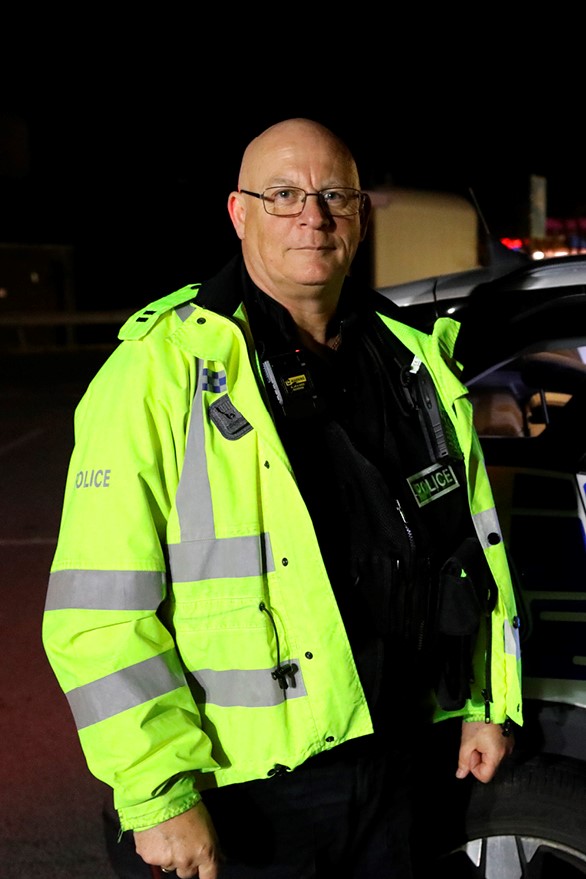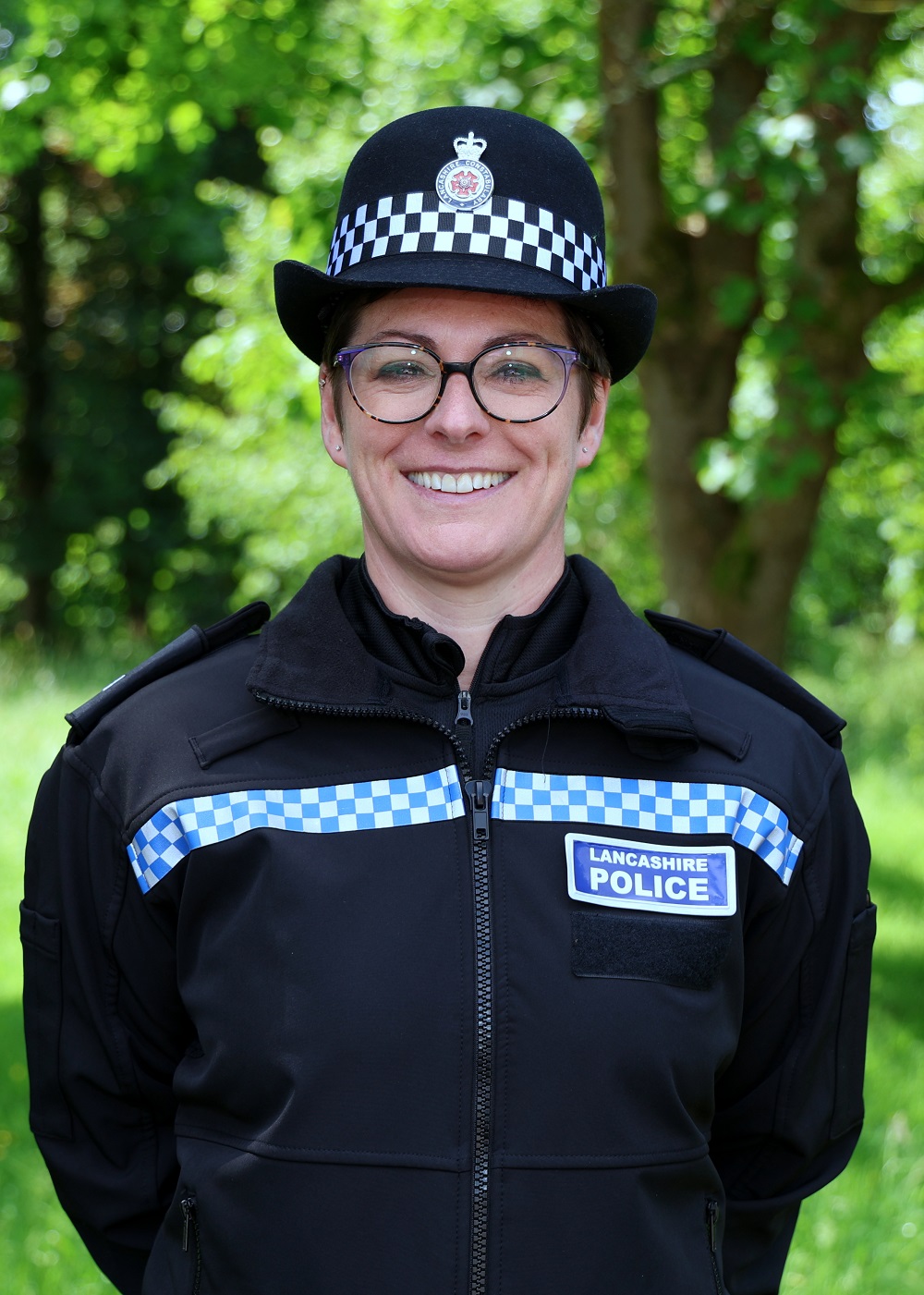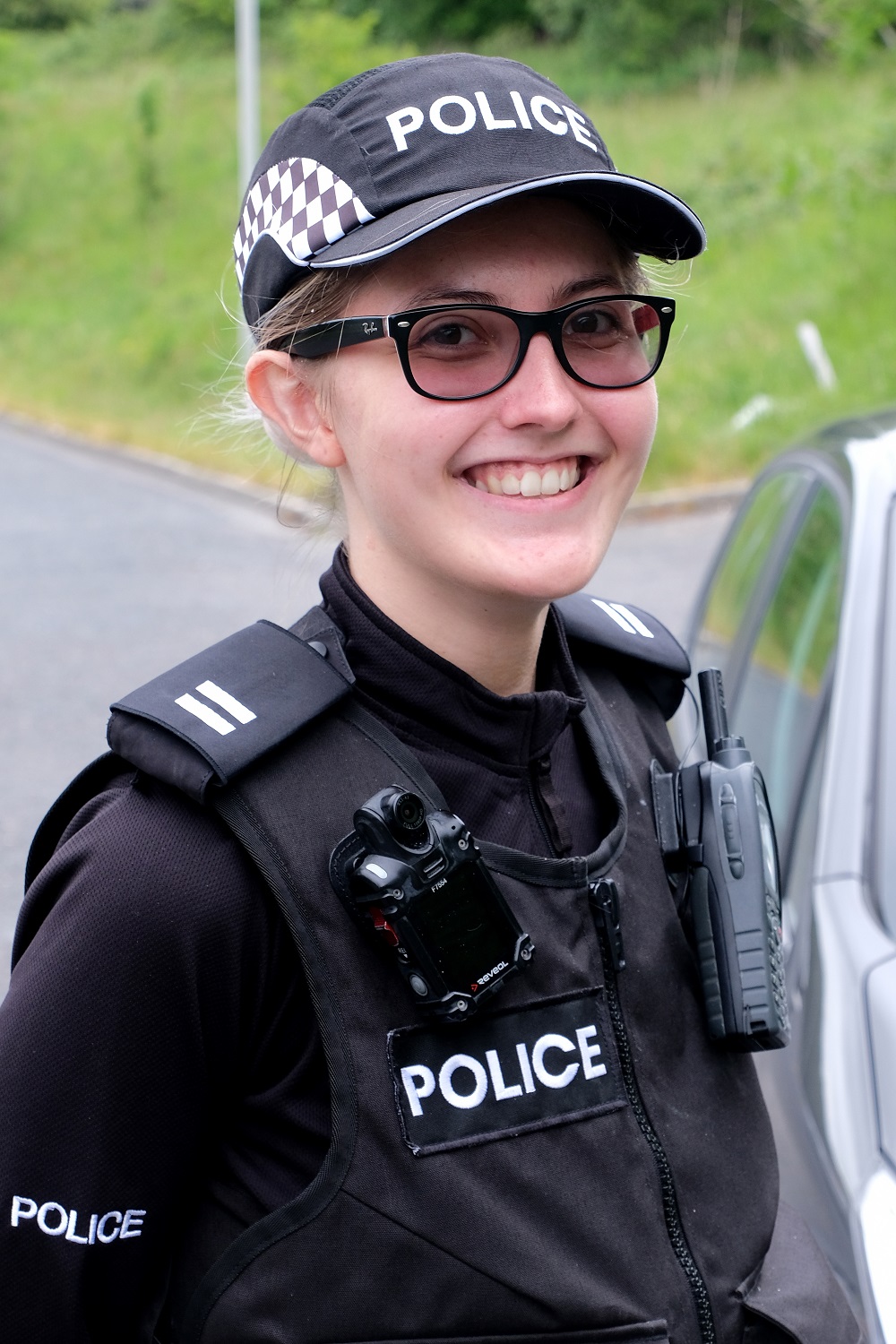Special Constables
Special Constable Recruitment
Applications are now closed.
Sign up to job alerts below to be notified when applications reopen.
Special Constables are volunteer police officers who come from all walks of life, bringing a vast range of skills and experience. They join from a huge variety of professions, including teachers, GPs, project managers, directors, retailers and just about any profession you can think of.
Specials are a vital and valued part of the Constabulary, with the same uniform and powers of arrest as Police Officers. Working on emergency response, duties could include providing a police presence in town centres on Friday nights, dealing with domestic violence incidents, helping people who are going through a mental health crisis, and giving evidence in court. Volunteers must commit to 16 hours a month, and it’s a 24/7 service, so flexibility is key. Specials may get some paid time off to volunteer if the company they work for is part of the Employer Supported Policing (ESP), a national Home Office scheme which partners employers with the police service.
Read about Special Constable Gareth Munroe who was a Postman by day and served as a Special Constable at night before he applied to become a Police Community Support Officer.
It takes dedication to sacrifice personal time for a challenging, unpaid role, however being a Special is extremely rewarding. There are fantastic opportunities to build on existing skills and develop new ones, and whilst it isn’t a direct route to becoming a paid police officer, Specials receive the same standard of training as a regular police officer and can progress through the rank system. Of course, the best reward of all is making difference to the community, helping to keep people safe and feeling safe.
What is involved?
Initial Training
You must be able to commit to 11 full weekends (in a 4 month period) of initial training at Police HQ Hutton, followed by an additional weekend a few months after your attestation. You will also need to complete associated E-Learning prior to and during this period.
Ongoing Training
Once you’ve completed your initial training you will be supported to complete on the job training to become an independent officer, this is achievable within 12 months. There will also be continuous mandatory training to attend to keep up your skill set.
Entry Requirements
You must have a minimum of GCSE grade C / Level 4 in English Language to apply.
Frequently Asked Questions – we have compiled a handy document which details the main frequently asked questions which is useful to read through before you apply.
Special Constables Application Process
When applications are open, you are able to complete and submit your form online. As of July 2022, there is an updated application form in place which is no longer a full Competency Based Question style application question set. This means that it will take around 10 minutes to complete the whole application form.
Make sure you read the application form carefully and provide full answers to all the questions.
You’ll need to meet the following:
Aged 17 or above on the day you apply and must be aged 18 or over upon appointment (we don’t have an upper age limit and value the life experience that career changers bring).
- Not be a member of the British National Party (BNP) or other organisations such as Combat 18 or The National Front.
- If you have a criminal record, this doesn’t mean you won’t be considered. This depends on the nature of your conviction. Please declare any cautions or convictions on your application form. If you don’t you could fail vetting due to integrity concerns.
- Vetting clearance is unlikely to be granted if you have existing county court judgements (CCJ) outstanding against you. If you have been registered bankrupt, clearance is unlikely until three years have passed since discharge of the debt.
- Tattoos which are offensive, garish, prominent or numerous are not acceptable. Please supply photos and measurements of any tattoos along with your application.
- You can re-attend our National Assessment Centre (NAC) if you failed the NAC within the last 3 months providing you were within 5% of the pass mark. Otherwise you will need to wait 6 months between taking the NAC.
- You must be a British Citizen, or hold a passport from a full EU Member State. You can also apply if you are a Commonwealth citizen or foreign national who is resident in the UK with indefinite leave to remain.
Vetting
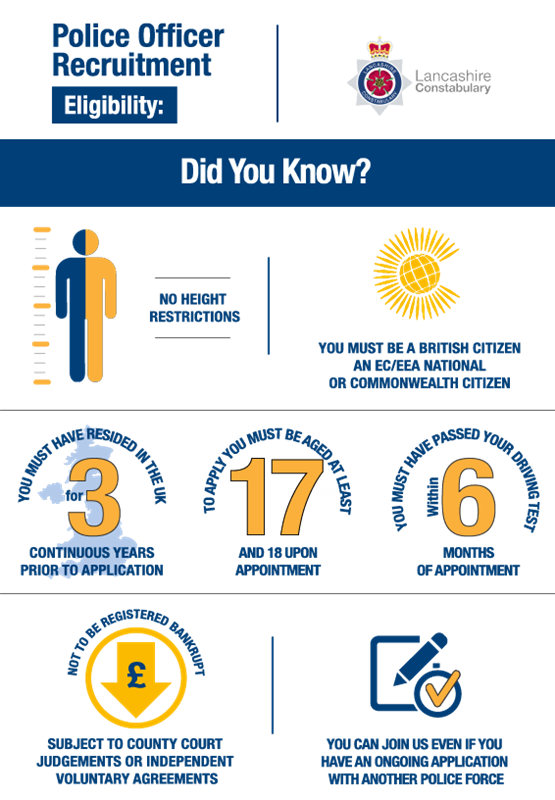
Residency Requirement
You must have lived in the UK for three continuous years, immediately before applying, to meet the minimum residency requirement. This is because we need to vet all applicants in an equitable manner, which requires a checkable history in the UK. Applicants who cannot be vetted cannot be appointed.
If you live permanently in the UK, you are considered to be a UK resident. If you have moved overseas and severed major ties to the UK (e.g. closed bank accounts and sold property) you are considered to have surrendered your residency in the UK. This applies to people who maintain bank accounts purely for the purpose of receiving regular payments, e.g. a UK pension.
If you have spent a significant period of time overseas (normally up to one year) without returning to the UK but intend to return in the future, then we may be able to consider you. This might apply, for example, if you have taken a gap year or similar before or following university, travelled for a year or spent time overseas visiting family (not an exhaustive list). We will need you to provide full details and will consider each case on its own merits.
If you have been posted overseas as part of your service with HMG or the armed forces you are considered to have been resident in the UK for the period that you were abroad.
If you have been overseas as the spouse, partner or dependent of a member of the armed forces posted overseas then it may be possible to obtain the necessary assurance for a checkable history to be established. We will consider each case on its merits.
Criminal Convictions
If you have convictions or cautions this doesn’t necessarily mean that we won’t be able to appoint you. It depends on the role you’ve applied for and the nature of the offence.
The Rehabilitation of Offenders Act 1974 (Exceptions) Order 1975 does not apply to police officer posts, including the special constabulary. You must therefore declare all previous convictions and cautions.
Lancashire Constabulary apply the criminal convictions guidance contained in the College of Policing Vetting Code of Practice and associated Authorised Professional Practice (APP), and will reject applications in all cases where:
- offences were committed as an adult or juvenile that resulted in a prison sentence (including custodial, suspended or deferred sentence and sentences served at a young offenders’ institution or community home);
- the applicant is, or has been, a registered sex offender or is subject to a registration requirement in respect of any other conviction.
For all other convictions or cautions we will reject applications where any of the following apply:
- offences where vulnerable people were targeted
- offences motivated by hate or discrimination
- offences of domestic abuse
We take particular care where an applicant has been convicted of (or cautioned for) offences of dishonesty, corrupt practice or violence, which will also likely result in rejection.
Where previous convictions or cautions are present the impact of having to disclose those as a serving officer in all criminal cases you deal with might preclude clearance being granted.
We consider each case on its own merits and, whilst you should presume convictions, cautions or other sanctions will lead to your application being rejected, there may be occasions where this will not be the case.
There may also be circumstances where your suspected involvement in crime, or criminal associations make an offer of employment inappropriate.
Financial Checks
Applicants should normally be free from significant debt or liability and be able to manage existing commitments. We place our emphasis on managing debt sensibly and will run a credit reference check on all applicants to provide an overview of the current financial position. This is compared to the information provided on the vetting form. Police Regulations state that a police officer shall not willfully refuse or neglect to discharge any lawful debt.
If you have existing county court judgements outstanding against you or have been registered bankrupt and have not discharged your bankruptcy we’ll be unable to consider your application. If you have been registered as bankrupt and have discharged the bankruptcy debts you won’t be considered until three years after the discharge of the debt. Debt Relief Orders (DRO) are treated the same as a bankruptcy.
We will consider your application carefully if a credit reference check reveals you have a current individual voluntary arrangement (IVA). We don’t make clearance decisions until we’ve seen evidence that you’ve maintained regular IVA repayments over a number of months taking into consideration also the size of the debt. The same principle applies where you have defaulted on accounts.
If you can show you have and are adhering to debt management arrangements you may be considered. We’ll need to see documentary evidence to demonstrate your commitment and adherence to any debt management arrangements and will consider each case on its own merits.
Open Source Checks – We will check content on publicly available social media sites.
Vetting Decisions – If your vetting is successful, our vetting unit will let the recruiting department know. If your clearance is declined our vetting unit will notify you personally and provide as much information as we can as to the reason. There may be occasions where we are unable to provide a detailed explanation. There is an appeal process available.
Once we receive your completed form, we will check it against our standard recruitment criteria – e.g. convictions and nationality. If you are eligible to work for Lancashire Constabulary, your application will move on to the next stage.
National Sift
All candidates will be required to undertake The National Sift, the exercises will measure a candidates suitability for the role of a Police Constable. The National Sift contains Situation Judgement Tests (SJT) and Behavioural Style Questions (BSQ).
Ahead of the National Sift the PC Recruitment team will send candidates the required information, including a link to the tests. Once a candidate completes all the elements of the National Sift they receive their result immediately.
At this stage you will be invited to attend an interview. This could be face to face or online via Microsoft Teams.
If your application passes the initial stages we will contact you to arrange an interview. The interview questions will be based around the same criteria as detailed on the candidate specification and will seek to find out how you would perform in the job in question. We would also suggest visiting other section of our website for information on our values and force priorities.
If you are successful at interview, we will send you a conditional offer of employment together with details of the next steps. This offer will be subject to security, health and reference checks.
View our detailed FAQ’s surrounding medical conditions before you complete your application form to understand any limitations there might be.
As a summary though;
Police officers encounter stressful situations, trauma, physical confrontation and work long hours on shifts. You’ll need to be resilient enough to cope with the demands and pressures of police working and be in good health mentally and physically.
After passing the recruitment stages, you’ll need to complete a medical questionnaire and get it signed by your doctor.
You’ll also be asked to provide a urine sample whilst at your appointment, which we’ll test for illegal substances.
We will test your hearing to ensure it meets home office standards.
We follow the Government’s guidance on police officer health requirements. You can find out more about these and check the list of specific health conditions.
Biometric Vetting
After your medical appointment, you will also be required to have your fingerprints scanned and a DNA sample (mouth swab) taken to check against the national police database.
Eye Sight
You must have:
Corrected distance vision of 6/12 or better with either the right eye or left eye.
6/6 vision with both eyes together with spectacles or contact lenses if worn.
Corrected near visual acuity of 6/9 or better, with both eyes.
You’ll need to go to an optician at the medical stage to have your eyes tested and this will be checked at your medical assessment. If you don’t meet the standard we’ll be unable to take your application any further. Please note that these are minimum standards and do not guarantee entry into specialist roles. You can wear glasses and contact lenses.
Information about colour blindness
If your colour blindness is monochromat, you will not meet the eyesight standard. However, trichromats and dichromats are acceptable.
Fitness
When it’s time to complete your fitness test we’ll invite you to our headquarters at Hutton, Preston.
Use the information below to help you to prepare for the fitness test. If you’re new to fitness training or are a beginner we recommend that you seek medical advice prior to commencing any exercise programme.
The test we use is the multi-stage endurance test (also known as the bleep test, shuttle run or pacer test). It’s a well-recognised test that gives a clear understanding of fitness level and one that you can practice prior to the assessment to give yourself the best possible chance of success.
If you don’t reach the required level, you won’t be able to proceed to the next stage. But, our assessor may give you the opportunity to try again.
If, after three attempts you haven’t been able to pass then you’ll need to wait 6 months before re-applying.
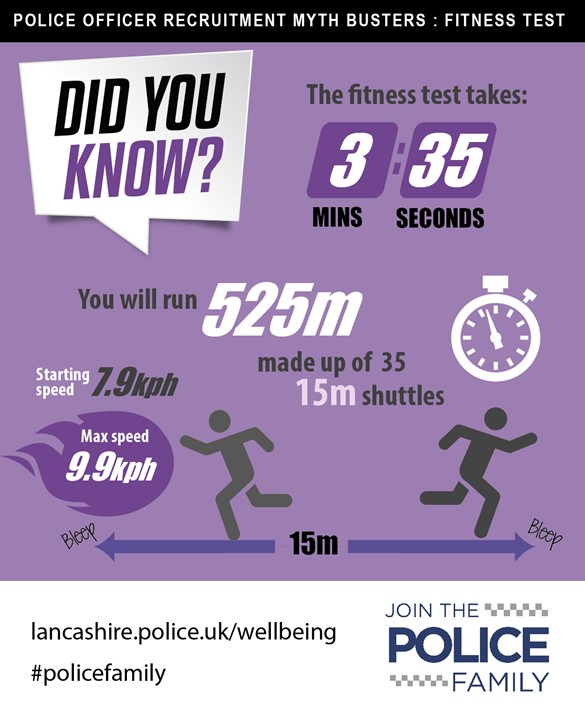
Bleep Test
The fitness test is part of police life. You’ll retake it as part of your training and also take the test every year to ensure you’re maintaining a suitable level of fitness for a service officer.
The multi-stage endurance fitness test is one of the most widely used tests of endurance. It’s also easy to prepare for as all you’ll need is a flat level surface that’s 15 metres long and you can use our training recording or look on iTunes or Google Play for a bleep test training app. If using an app for your practice, ensure it is for 15 metres as some are for 20 metre runs.
What to Expect at the Bleep Test
The test involves running back and forth in a straight line continuously along a 15 metre track. Every time you reach the edge you’ll place your foot on the line and turn, ready for the next bleep when you’ll set off again.
The test is progressive in that the bleeps start off slowly but become closer together so as the test progresses you’ll need to run faster to reach the edge before the next bleep.
The first running speed is ‘level 1’, the second is ‘level 2’ and so on. Each level lasts around 50 seconds, but the number of shuttles at each level increases as the test progresses.
At the end of each level you’ll hear a double bleep and the fitness tester will announce that you’re starting a new level. You’ll need to reach a ‘level 5.4’ rating to pass the test.
After all of the above has taken place you will be given a formal offer of employment and you discuss start dates for your exciting new career!

